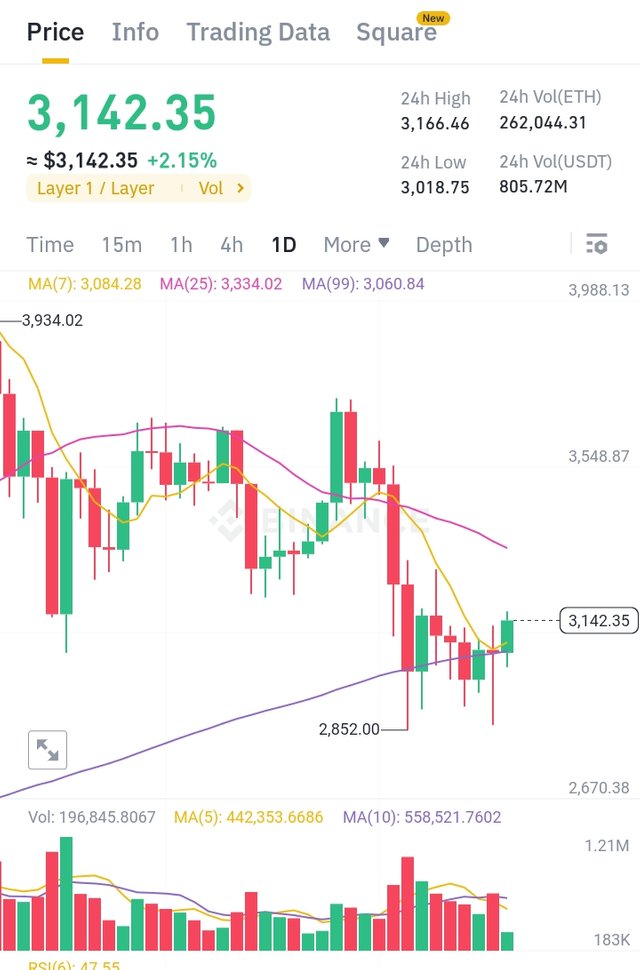Unpacking Ethereum (ETH): Beyond the Cryptocurrency

Unpacking Ethereum (ETH): Beyond the Cryptocurrency
Ethereum (ETH), often overshadowed by its big brother Bitcoin (BTC), is more than just another cryptocurrency. It's a powerful platform built on blockchain technology that allows for the creation of decentralized applications (dApps) and smart contracts. This blog post delves into the world of Ethereum, exploring its unique functionalities and its potential to reshape the future of finance, the internet, and beyond.
From Digital Currency to Programmable Blockchain: The Ethereum Story
Ethereum's journey began in 2013 with a vision from Vitalik Buterin, a young programmer who saw limitations in Bitcoin's purely transactional nature. Buterin envisioned a platform that could not only handle digital currency but also facilitate the creation of programmable contracts on the blockchain. These contracts, called smart contracts, could automate agreements and transactions without the need for intermediaries.
In 2015, the Ethereum blockchain was launched, introducing the world to a revolutionary concept. Ether (ETH), the native currency of the platform, became a vital component for powering transactions and interacting with dApps built on Ethereum.
Demystifying Ethereum: Understanding the Core Concepts
To grasp Ethereum's capabilities, let's explore its key elements:
Blockchain: Ethereum utilizes a blockchain similar to Bitcoin, but with some key differences. Ethereum's blockchain is designed to be more flexible and programmable, allowing for the creation of smart contracts.
Ether (ETH): This cryptocurrency functions as the fuel for the Ethereum network. Users need ETH to interact with dApps, execute smart contracts, and pay transaction fees.
Smart Contracts: These self-executing contracts reside on the blockchain and automate agreements based on predefined conditions. When certain criteria are met, the terms of the contract are automatically fulfilled, eliminating the need for trusted third parties.
dApps (Decentralized Applications): Built on top of the Ethereum blockchain, dApps are applications that operate without a central authority. They leverage smart contracts to deliver a wide range of functionalities, from decentralized finance (DeFi) to gaming and identity management.
The Ethereum Advantage: A Platform for Innovation
Compared to Bitcoin, Ethereum offers a broader spectrum of functionalities:
Programmability: Smart contracts enable automation and trustless interactions, opening doors for innovative applications across various industries.
Decentralization: Like Bitcoin, Ethereum operates without a central authority, promoting transparency and censorship resistance.
Community-Driven: Ethereum is backed by a strong developer community constantly innovating and expanding the ecosystem.
Diverse Use Cases: The platform fosters the creation of dApps catering to various needs, from financial services to supply chain management.
These advantages position Ethereum as a platform for groundbreaking innovation, capable of disrupting traditional models across numerous sectors.
Exploring the Ethereum Ecosystem: A Glimpse into the DApp World
The Ethereum dApp ecosystem is teeming with possibilities. Here's a peek into some of the prominent areas of exploration:
Decentralized Finance (DeFi): DeFi applications offer alternatives to traditional financial services, enabling peer-to-peer lending, borrowing, and trading without relying on banks or financial institutions.
Non-Fungible Tokens (NFTs): NFTs have exploded in popularity, representing digital ownership of unique assets like artwork, collectibles, and in-game items. Ethereum is a leading platform for NFT creation and trading.
Decentralized Autonomous Organizations (DAOs): DAOs are internet-native communities governed by rules encoded in smart contracts. Members collectively make decisions regarding the organization's operations and treasury.
These are just a few examples, and the possibilities are constantly expanding as developers create new and innovative dApps on the Ethereum platform.
Challenges and Considerations: Navigating the Ethereum Landscape
Despite its potential, Ethereum faces challenges for widespread adoption:
Scalability: Similar to Bitcoin, the Ethereum network encounters limitations in processing a high volume of transactions. Scaling solutions are under development, but this remains a crucial hurdle.
Security Concerns: While the Ethereum blockchain is secure, smart contracts are susceptible to bugs and vulnerabilities that can lead to hacks and exploits.
Regulation: Regulatory uncertainty regarding cryptocurrencies and dApps can create challenges for businesses and users.
Overcoming these obstacles will be essential for Ethereum to reach its full potential. However, the ongoing development efforts within the Ethereum community suggest a commitment to addressing these challenges and solidifying Ethereum's position as a leading blockchain platform.
Beyond Finance: The Broader Impact of Ethereum
The implications of Ethereum reach far beyond the realm of finance. Here are some potential areas of transformation:
Supply Chain Management: Blockchain technology can track goods efficiently and ensure transparency throughout the supply chain.
Identity Management: Secure and decentralized identity solutions can empower individuals to control their personal data.
Voting Systems: Ethereum's secure and transparent nature can lead to more secure
Ethereum is one good gem I'm not gonna give up on as I believe its ecosystem has potential yet to be tapped. I'm hoping that ETH will hit above 5K+ USDT price post BTC halving so that I could have a good boost in my PF at BG platform while participating in the shark fin earn product.